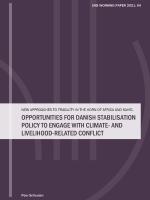Opportunities for Danish stabilisation policy to engage with climate- and livelihood-related conflict
The Horn of Africa and the Sahel are among the most fragile regions in the world: poor, lacking basic infrastructure and state presence across much of their respective territories, and both form hotbeds of conflict and political instability compounded by climate change.
This DIIS Working Paper focuses on identifying evolving notions of fragility that could strengthen Danish stabilisation efforts in the Horn and Sahel. It foregrounds notions of fragility that move away from a focus on strong state institutions towards the adaptive capacities of populations in the hinterlands of the Horn and the Sahel to deal with conflict and climate variability. The paper gives an overview of this rapidly evolving field and distils key insights, challenges and future options by exploring the question, how can we support people in the Sahel and Horn to re-establish their responsibility for their respective territories and the management of their natural resources?
The paper addresses this question by exploring the implications of recent climate change and livelihoods research on how we approach fragility and, by extension, stabilisation. On the basis of such research, the Working Paper advocates a move away from a sector-based understanding of fragility towards a way of working that is more in line with contextual realities, alongside the ‘comprehensive approach’ to stabilisation that Denmark promotes.
The key message is that, programmatically, Danish stabilisation efforts across both regions could benefit from a more explicit focus on supporting the variability that dominant livelihood strategies require and that need to be considered if sustainable security and development outcomes are to be achieved. Failing to do this will only serve to marginalise key communities and may drive them further into the arms of radical groups.
We posit that farmers and herders are experts in dealing with variability, and we discuss best practices and emerging policy options for harnessing these skills so as to mitigate and address challenges at the nexus of climate change and conflict effectively. The main recommendations are:
- Make explicit a focus on variability in supporting adaptive and resilient livelihoods, predicated on seasonal mobility.
- Adopt a ‘system of systems’ approach to stabilisation to support the complementarity of herding and farming in shared resource ecologies.
- Involve local communities in the governance of remote hinterlands.
- Bring the state back in through maintenance and inclusive service delivery.
- Include discussions of the return of the state's authority in peace negotiations.
- Mainstream the maintenance of local infrastructure.
- Promote coherence and a geographical focus between overlapping regional and national stabilisation efforts.
- Adopt a mobility perspective on development efforts, aligning them to livestock supply chains, transhumance corridors and seasonal migration routes.
This DIIS Working Paper has received financial support from the Ministry of Foreign Affairs of Denmark. It reflects the views of the author alone.
DIIS Experts


